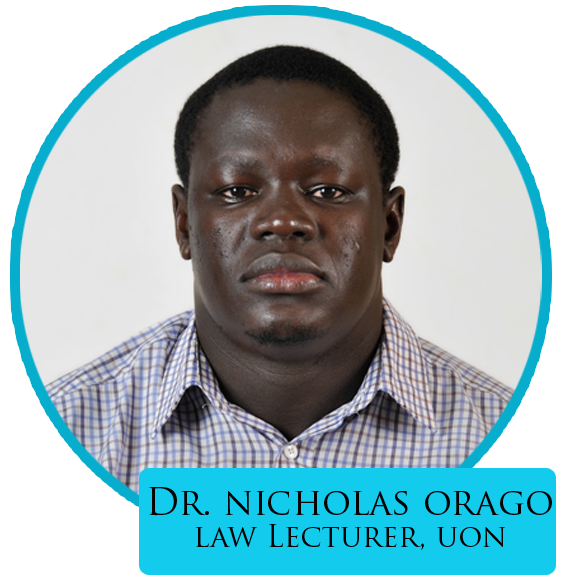
Dr. Orago is a human rights advocate and academic with his main interest area being economic and social rights. He has taught, trained and consulted extensively in this and related areas of international human rights law and presented papers in international conferences and seminars. He is Executive Director, Economic and Social Rights Centre – Hakijamii Trust, a National Nongovernmental Organization working in the area of economic and social rights for the marginalized and vulnerable communities in Kenya. As an academic he teaches International Human Rights Law; Tax and Human Rights; Law and Development; and law, environment and development at the faculty
Dr. Orago also has great research interest in climate change, disaster law and sustainable development. He is a Member of the Horn of Africa Climate Justice Network and the Pan African Climate Justice Alliance undertaking research and documentation on the impact of climate change in Africa, analyzing climate change as a driver and threat multiplier of conflicts in Africa, and the place of human rights in enhancing accountability for the adverse impacts of climate change, especially in the context of just transition.
The human rights advocate recently published a study titled "Trans boundaries: African heterodox ideologies for the realization of sustainable development in the continent" with the Vienna Institute for International Dialogue and Cooperation.
https://www.vidc.org/fileadmin/martina/studien/transboundaries_nicholas_orago_july2021_final.pdf
Other publications include; ‘The 2010 Kenyan Constitution and the hierarchical place of international law in the Kenyan domestic legal system’: A comparative perspective
Abstract: The prominent use of international human rights law in a state's domestic legal system depends on the hierarchical place occupied by international law in general, and international human rights law in particular, among the sources of law in that particular legal system. Two systems of receipt of international law in the domestic legal systems have been used by different states: monism, which looks to directly incorporate ratified international law treaties in a state's domestic legal system; and dualism, which entails the transformation of international law into the domestic legal system through the domestication of ratified international law treaties by means of the enactment of parliamentary legislation. Kenya, as a Commonwealth country, has always primarily followed a dualist approach which requires that domesticating legislation be enacted by parliament for ratified international law treaties to have application in the domestic legal system. However, with the promulgation of the new Constitution in August 2010, international law has been given a more prominent role in the domestic legal system through the inclusion in the Constitution of a provision directly incorporating ratified treaty law into the Kenyan legal system as a legitimate source of law.
This article is primarily focused on analyzing the hierarchical place of international law, specifically international human rights treaty law, in the Kenyan domestic legal system in the context of the new constitutional dispensation. It recommends that in order for international human rights law to have a prominent place in the governance of the country, article 2(6) of the Constitution should be interpreted progressively so as to give international human rights law norms an infra-constitutional but a supra-legal status in the domestic legal system. In this way, international human rights law will act as a bulwark against recession to totalitarian rule, as well as safeguard the democratic and fundamental rights protection gains that were won in the struggle for constitutional change.
https://www.ahrlj.up.ac.za/orago-n-w
To view more publications from Dr. Orago
https://scholar.google.com/scholar?hl=en&as_sdt=0%2C5&q=nicholas+orago&btnG=
